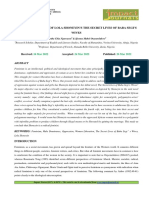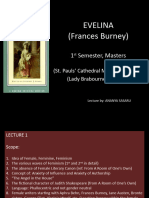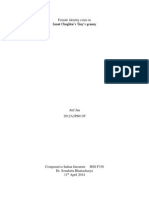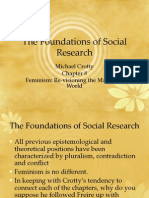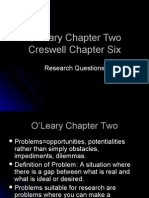0 ratings0% found this document useful (0 votes)
127 viewsQuiz Crotty Chapter 8
Quiz Crotty Chapter 8
Uploaded by
Lindsay R. CalhounTong outlines 7 categories of feminism in the chapter. Existentialist feminism includes major voices like Simone de Beauvoir. Radical feminism suggests that eradicating patriarchy is necessary to liberate women from oppression. Carol Gilligan suggested that women "speak in a different voice." Sara Ruddick was concerned with "outlaw emotions."
Copyright:
Attribution Non-Commercial (BY-NC)
Available Formats
Download as DOC, PDF, TXT or read online from Scribd
Quiz Crotty Chapter 8
Quiz Crotty Chapter 8
Uploaded by
Lindsay R. Calhoun0 ratings0% found this document useful (0 votes)
127 views1 pageTong outlines 7 categories of feminism in the chapter. Existentialist feminism includes major voices like Simone de Beauvoir. Radical feminism suggests that eradicating patriarchy is necessary to liberate women from oppression. Carol Gilligan suggested that women "speak in a different voice." Sara Ruddick was concerned with "outlaw emotions."
Original Description:
Quiz for Crotty Chapter 8
Copyright
© Attribution Non-Commercial (BY-NC)
Available Formats
DOC, PDF, TXT or read online from Scribd
Share this document
Did you find this document useful?
Is this content inappropriate?
Tong outlines 7 categories of feminism in the chapter. Existentialist feminism includes major voices like Simone de Beauvoir. Radical feminism suggests that eradicating patriarchy is necessary to liberate women from oppression. Carol Gilligan suggested that women "speak in a different voice." Sara Ruddick was concerned with "outlaw emotions."
Copyright:
Attribution Non-Commercial (BY-NC)
Available Formats
Download as DOC, PDF, TXT or read online from Scribd
Download as doc, pdf, or txt
0 ratings0% found this document useful (0 votes)
127 views1 pageQuiz Crotty Chapter 8
Quiz Crotty Chapter 8
Uploaded by
Lindsay R. CalhounTong outlines 7 categories of feminism in the chapter. Existentialist feminism includes major voices like Simone de Beauvoir. Radical feminism suggests that eradicating patriarchy is necessary to liberate women from oppression. Carol Gilligan suggested that women "speak in a different voice." Sara Ruddick was concerned with "outlaw emotions."
Copyright:
Attribution Non-Commercial (BY-NC)
Available Formats
Download as DOC, PDF, TXT or read online from Scribd
Download as doc, pdf, or txt
You are on page 1of 1
Quiz Crotty Chapter 8
1. List Tong’s seven categories of feminism.
2. Which of the categories boasts Simone De Beauvoir as one of its major voices?
3. Which of the categories suggests that the eradication of patriarchy is necessary for
women to liberate themselves from oppression?
4. Which feminist epistemologist suggested that women “speak in a different
voice”?
5. Which feminist epistemologist was concerned with “outlaw emotions?”
You might also like
- AIC 4. Critical Theory in An Inspector Calls Grade 9Document8 pagesAIC 4. Critical Theory in An Inspector Calls Grade 9rtgmurtaghNo ratings yet
- The Foundations of Social Research CH 6Document18 pagesThe Foundations of Social Research CH 6Lindsay R. Calhoun80% (5)
- The Foundations of Social Research CH 6Document18 pagesThe Foundations of Social Research CH 6Lindsay R. Calhoun80% (5)
- 6th Central Pay Commission Salary CalculatorDocument15 pages6th Central Pay Commission Salary Calculatorrakhonde100% (436)
- 6th Central Pay Commission Salary CalculatorDocument15 pages6th Central Pay Commission Salary Calculatorrakhonde100% (436)
- "Feminisms" by Fiona Tolan: An AnalysisDocument23 pages"Feminisms" by Fiona Tolan: An AnalysisNitika Singla75% (12)
- The Foundations of Social Research CH 9Document27 pagesThe Foundations of Social Research CH 9Lindsay R. Calhoun100% (7)
- The Foundations of Social Research CH 4Document29 pagesThe Foundations of Social Research CH 4Lindsay R. Calhoun100% (7)
- The Foundations of Social Research CH 2Document28 pagesThe Foundations of Social Research CH 2Lindsay R. Calhoun77% (13)
- Soc414 Essay1Document8 pagesSoc414 Essay1Kat CasaubonNo ratings yet
- 06 Chapter 2Document32 pages06 Chapter 2Laxman PariharNo ratings yet
- A Doll's House7Document4 pagesA Doll's House7lavina marwahNo ratings yet
- De Beauvoir PDFDocument4 pagesDe Beauvoir PDFrinu rinuNo ratings yet
- The Second SexDocument8 pagesThe Second SexDan MaverickNo ratings yet
- Feminist Approach in Literary Criticism 075450Document59 pagesFeminist Approach in Literary Criticism 075450Rain RayalaNo ratings yet
- Feminism/ IndianDocument6 pagesFeminism/ IndianPal GuptaNo ratings yet
- Andres, Chua, Reillo, Paminiano, YamaneDocument15 pagesAndres, Chua, Reillo, Paminiano, YamaneVincent Gabriel ChuaNo ratings yet
- FeminismDocument22 pagesFeminismSHIELA MAY PIANONo ratings yet
- Simone de BeauvoirDocument2 pagesSimone de BeauvoiransarshkNo ratings yet
- 1984 Discussion QuestionsDocument2 pages1984 Discussion QuestionsAna Gabriela BatallanNo ratings yet
- John Fowles Visionary and VoyeurDocument259 pagesJohn Fowles Visionary and VoyeurClaudia Calavri100% (1)
- 26-03-2022-1648288865-6-Impact - Ijrhal-8. Ijrhal - A Feminist Reading of Lola Shoneyin's The Secret Lives of Baba Segi's WivesDocument16 pages26-03-2022-1648288865-6-Impact - Ijrhal-8. Ijrhal - A Feminist Reading of Lola Shoneyin's The Secret Lives of Baba Segi's WivesImpact JournalsNo ratings yet
- Discussion Questions For Camus, Myth of Sisyphus (With Cribs)Document1 pageDiscussion Questions For Camus, Myth of Sisyphus (With Cribs)Mark FloryNo ratings yet
- Radical Feminism Today Denise Thompson PDFDocument172 pagesRadical Feminism Today Denise Thompson PDFfluffybaer2259No ratings yet
- Material For LRM PresentationDocument3 pagesMaterial For LRM Presentationemltuyull7No ratings yet
- Intro To Feminsm 2Document13 pagesIntro To Feminsm 2api-516209320No ratings yet
- Feminism 1Document20 pagesFeminism 1Imie AlmueteNo ratings yet
- Being Lovingly, Knowingly Ignorant: White Feminism and Women of ColorDocument19 pagesBeing Lovingly, Knowingly Ignorant: White Feminism and Women of ColoranabetuneNo ratings yet
- Existentialist Feminist 2022Document14 pagesExistentialist Feminist 2022Pramuka MranggenNo ratings yet
- Challenge 9' Your Analysis - Incorporating Critical Theory: ObjectiveDocument12 pagesChallenge 9' Your Analysis - Incorporating Critical Theory: ObjectiveammarNo ratings yet
- Feministtheory 220421130212Document18 pagesFeministtheory 220421130212escototomarkjames078No ratings yet
- Feminist Theory Is The Extension Of: Universal IndividualityDocument28 pagesFeminist Theory Is The Extension Of: Universal IndividualityAnna Rosalie DawalNo ratings yet
- Feminism PPT FixDocument8 pagesFeminism PPT Fixnovi nurNo ratings yet
- Feminism & Care EthicsDocument38 pagesFeminism & Care EthicsZain MamunNo ratings yet
- Feminism 1Document22 pagesFeminism 1Biswamitra RanaNo ratings yet
- Class 1Document12 pagesClass 1Caroline PlummerNo ratings yet
- FlamingoDocument2 pagesFlamingogullukagyaanNo ratings yet
- Artikel RMDocument19 pagesArtikel RMnasyiatul15akunduaNo ratings yet
- Feminist Critics and Their TheoriesDocument7 pagesFeminist Critics and Their TheoriesMANJUNATH BHEEMANNAVARNo ratings yet
- Feminism - NotesDocument4 pagesFeminism - Notesrayanrizwan280512No ratings yet
- Yogie Pranowo - STF DriyarkaraDocument23 pagesYogie Pranowo - STF DriyarkaraRahma Binti IfadahNo ratings yet
- French Feminism The Disruptive Force of The FeminineDocument22 pagesFrench Feminism The Disruptive Force of The FeminineEYAJABEURNo ratings yet
- Beyond Ontology and Sexual Difference: An Interview With The Italian Feminist Philosopher Adriana CavareroDocument40 pagesBeyond Ontology and Sexual Difference: An Interview With The Italian Feminist Philosopher Adriana CavareroCarolina SourdisNo ratings yet
- PG 1 ST Paul's and Lady BrabourneDocument53 pagesPG 1 ST Paul's and Lady Brabournearunesh.seal2002No ratings yet
- Race & Essentialism in Feminist Legal Theory (Angela Harris) Pp. 574-582Document2 pagesRace & Essentialism in Feminist Legal Theory (Angela Harris) Pp. 574-582TLSJurSemSpr2010100% (1)
- Postmodern Feminism: Postmodern Feminism Is A Mix of Post Structuralism, Postmodernism, and French FeminismDocument5 pagesPostmodern Feminism: Postmodern Feminism Is A Mix of Post Structuralism, Postmodernism, and French Feminismgavneet singhNo ratings yet
- 5 Reasons Stoicism Is Better Than Everything 1Document34 pages5 Reasons Stoicism Is Better Than Everything 1MNo ratings yet
- Female Identity Crisis in Ismat Chughtai's Short StoryDocument14 pagesFemale Identity Crisis in Ismat Chughtai's Short Storybilhaqh7100% (1)
- FEMINISM (Queer Theory)Document8 pagesFEMINISM (Queer Theory)Widatul FajariyahNo ratings yet
- CHAPTER 1 Thinking Clearly and Learning From Experience: The Beginning of Our New WorldDocument15 pagesCHAPTER 1 Thinking Clearly and Learning From Experience: The Beginning of Our New WorldFikisile Fikie ZikodeNo ratings yet
- The Second Sex - WikipediaDocument10 pagesThe Second Sex - WikipediaAdnan Ghani KhanNo ratings yet
- Feminism & The Ethics of Care: (Written Report)Document6 pagesFeminism & The Ethics of Care: (Written Report)SteffNo ratings yet
- Feminist Literary TheoryDocument15 pagesFeminist Literary TheoryManal AlJibreenNo ratings yet
- UNDERSTANDING SUICIDE THROUGH THE LENS OF LIBERTARIANISM, Paz Daniela Ortiz Santa MariaDocument19 pagesUNDERSTANDING SUICIDE THROUGH THE LENS OF LIBERTARIANISM, Paz Daniela Ortiz Santa MariapazteinsNo ratings yet
- Feminism: MELC: Critique A Literary Selection Based On A Feminist ApproachDocument16 pagesFeminism: MELC: Critique A Literary Selection Based On A Feminist ApproachIyah Xyza VenturaNo ratings yet
- FeminismDocument12 pagesFeminismtekula akhilNo ratings yet
- Feminist Theories Assignmnent 1Document7 pagesFeminist Theories Assignmnent 1Kulzum FatimaNo ratings yet
- Feminism 23 April 2018: 1 IR6003 - AY16-17 - TanseesengDocument16 pagesFeminism 23 April 2018: 1 IR6003 - AY16-17 - TanseesengJessica YeoNo ratings yet
- Feminism Feminist Theory WikiDocument2 pagesFeminism Feminist Theory WikiSuerte Jemuel RhoeNo ratings yet
- Persuasion - Coopman and Beyond... RevisedDocument2 pagesPersuasion - Coopman and Beyond... RevisedLeah AoyagiNo ratings yet
- Sisterhood Is Powerful by Robin Morgan PresentationDocument19 pagesSisterhood Is Powerful by Robin Morgan Presentationapi-356217440No ratings yet
- The Second Sex by Sımone de BeauvoırDocument10 pagesThe Second Sex by Sımone de Beauvoıremreakbas0476No ratings yet
- 30 Essential Feminist BooksDocument8 pages30 Essential Feminist Booksmonstrete100% (1)
- The Foundations of Social Research CH 8Document19 pagesThe Foundations of Social Research CH 8Lindsay R. Calhoun100% (2)
- Feminism in Literature: International Journal of Advanced Educational ResearchDocument2 pagesFeminism in Literature: International Journal of Advanced Educational ResearchPPISMP TESL 1 2015No ratings yet
- O'Leary and Creswell Chapter TwoDocument24 pagesO'Leary and Creswell Chapter TwoLindsay R. Calhoun100% (1)
- The Foundations of Social Research CH 8Document19 pagesThe Foundations of Social Research CH 8Lindsay R. Calhoun100% (2)
- Quiz Crotty Chapter 9Document1 pageQuiz Crotty Chapter 9Lindsay R. CalhounNo ratings yet
- The Foundations of Social Research CH 7Document39 pagesThe Foundations of Social Research CH 7Lindsay R. Calhoun50% (2)
- The Foundations of Social Research CH 5Document26 pagesThe Foundations of Social Research CH 5Lindsay R. Calhoun100% (2)
- The Foundations of Social Research CH 5Document26 pagesThe Foundations of Social Research CH 5Lindsay R. Calhoun100% (2)
- The Foundations of Social Research CH 3Document23 pagesThe Foundations of Social Research CH 3Lindsay R. Calhoun100% (5)



















